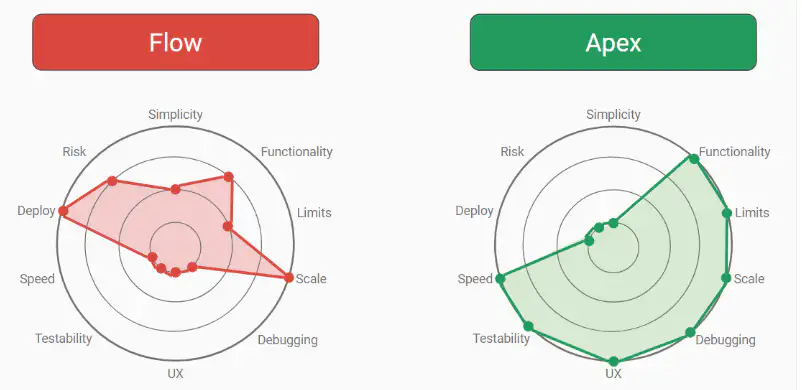Discover the key differences between Salesforce Apex and Flow. Learn when to use Apex vs Flow (code vs. clicks), their advantages, use cases, and how to combine both tools for effective Salesforce development.
Choosing between Apex and Flow, two powerful tools within the Salesforce ecosystem, can significantly impact your approach to automation and customization. Each tool has unique strengths and is suited to different use cases, making it essential to understand when to use declarative tools like Flow or programmatic solutions like Apex. This guide explores the differences, use cases, and how to decide which tool to use for your Salesforce development needs.

What is Salesforce Flow?
Salesforce Flow is a declarative tool that allows users to automate business processes visually. Designed for administrators and non-developers, Flow is user-friendly and enables automation through drag-and-drop functionality without writing code.
Key Features of Flow
- Visual Workflow: Automate processes with an intuitive interface.
- Use Cases: Ideal for screen flows, data updates, and simple to moderately complex logic.
- Accessibility: Tailored for admins and users without coding expertise.
- Maintenance: Easy to manage and update as business processes evolve.
Flow is a preferred choice for quick, low-code solutions that do not require advanced customization.
What is Apex in Salesforce?
Apex is Salesforce’s proprietary programming language, offering unparalleled flexibility for advanced customizations and complex business logic. Developers use Apex for scenarios where declarative tools fall short.
Key Features of Apex
- Custom Logic: Handle intricate workflows and computations.
- Integration: Connect Salesforce with external systems seamlessly.
- Scalability: Manage large data volumes and complex automation needs.
- Control: Fine-tuned customization with precise control over processes.
Apex is the go-to solution for developers looking to extend Salesforce’s capabilities beyond declarative limits.
Apex vs. Flow: A Detailed Comparison
Understanding the key differences between Apex and Flow can help you make informed decisions.
| Feature | Salesforce Flow | Apex |
|---|---|---|
| Skill Requirement | No coding skills required | Requires programming knowledge |
| Complexity Handling | Suitable for simple to moderately complex logic | Ideal for complex workflows and integrations |
| Performance | Limited to moderate data processing | Handles large-scale data efficiently |
| Flexibility | Restricted to built-in functionality | Highly flexible for custom logic |
| Ease of Maintenance | Easier to maintain and update | Requires developer expertise for updates |
Interview Questions: Apex vs. Flow
Q1. When would you use Flow instead of Apex?
A: Use Flow when automating straightforward processes such as record updates, screen flows, or basic approval workflows. Flow is ideal for non-developers and scenarios where coding is unnecessary.
Q2. What are the primary advantages of using Apex over Flow?
A: Apex provides:
- Advanced flexibility for custom logic.
- Integration with external systems.
- The ability to handle large data volumes efficiently.
- Support for complex business logic beyond declarative capabilities.
Q3. Can Apex and Flow be used together?
A: Yes, Apex and Flow can complement each other. For example:
- Use Flow for user-friendly interface processes and simple automations.
- Call Apex within Flow for complex computations or integrations.
Q4. What is a common limitation of Flow compared to Apex?
A: Flow is limited in handling highly complex workflows and large-scale data processing. It is also constrained to predefined functionality, whereas Apex allows for complete customization.
Q5. How does the maintenance of Flow compare to Apex?
A: Flows are easier to maintain and update, especially for non-technical users. Apex requires developer expertise for modifications and long-term management.
Q6. Which tool would you recommend for integrating Salesforce with external systems?
A: Apex is better suited for external system integration as it supports API calls and complex logic required for seamless data exchange between platforms.
Q7. How do Flow and Apex differ in terms of performance?
A: While Flow performs well for moderate data processing, Apex is optimized for high-performance operations, making it suitable for handling large datasets or batch processes.
Conclusion
The choice between Apex and Flow in Salesforce development depends on your specific project needs and team expertise. While Flow provides simplicity and speed for standard automation, Apex delivers the flexibility and power needed for advanced customization. Understanding when and how to use these tools effectively ensures that you build robust, scalable, and maintainable solutions in Salesforce.
Ready to explore Salesforce development further? Let us know your experiences with Apex and Flow in the comments below!